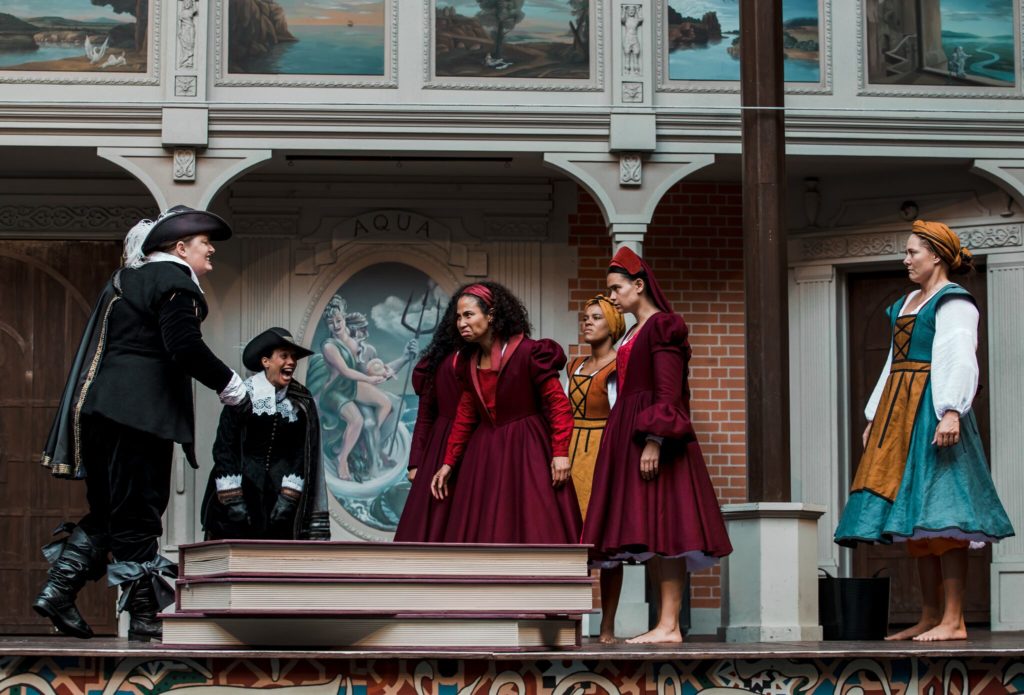Sexism is the most fundamental and intimate of all the prejudices because it infects our own families and those nearest to us – our mothers, sisters, wives, aunts, grand-mothers, daughters.
This idea is explored exquisitely in the play Emilia which runs for three weeks at the Pop Up Globe in Auckland.
Set in sixteenth century, it fictionalises the story of England’s first female poet Emilia Lanier (née Bassano).
She lived in a time when Gloriana herself, the formidable Queen Bess sat on the throne, yet women were still viewed as feeble and mere chattels who were incapable of doing much beyond giving birth and attending to domestic duties.
In the play, Emilia is not content with the status quo, she is fed up with the patriarchy, she has a voice, and she intends to use it. Over the course of the play she encounters women who have been oppressed, but also women who share her desire for emancipation. She also encounters men – some of whom are kind, but most of whom are abusive, or manipulative, or simply desire her sexually.
Emilia is an exceptional play and its strength lies in two things.
The first is the clever and sharp script by Morgan Lloyd Malcom that excoriates male-centric power and domination with anger, wit, and energy.
The second is the sensational all-female cast.
Having no male actors is perfect because the ‘men’ on stage can then be seen as archetypes who represent male dominance, arrogance, and fragility without it getting personal. To a man in the audience, watching a woman play a man, is illuminating. He can see sexism and oppression play out in front of him, external to him, and therefore absorb the truth about their devastating effects.
And those truths are heart breaking. There is a line in the play that essentially says “when a women grows up she must shrink.” In the context of the time period the play is set, it means she must be a ‘lady,’ become meek and obedient, control her urges, her temper. Even her body must be controlled by corsets and layers of clothing lest she become a ‘temptation.’
Without obedience, a woman becomes a ‘harlot,’ an ‘outcast’, a ‘criminal’, or even more dangerous, a ‘witch’.
It would be easy to think that a play set 400 years ago has no relevance today, that in our more enlightened time, women are not made to ‘shrink’. But despite its set dressing and costumes this is a contemporary story.
On the day Emilia opened in Auckland, Elizabeth Warren dropped out of the race for the White House leaving two white men in their late 70s as the final contenders for the Democratic Party nomination. Whoever wins that will square off against the current President – an old white misogynist.
On the same day, the UN released a report showing that globally, 90% of men and women around the world hold some sort of bias against women.
Read that again….. 90% of men AND woman.
And also on the same day, Britain’s High Court issued a judgement that the ruler of Dubai was responsible for the abduction of his own daughters and the imprisonment and possible torture of one of them.
Toward the end of the play, an aged Emilia tries to make sense of why men treat women so badly. She cannot understand it, because men are born of women. Men love, and make love, to women. So why do they beat them, murder them, and devalue them?
It’s a devastating question.
Emilia has been described as a feminist play, but it is far more than that.
Superbly written and performed, wildly funny, provocative, heart-breaking and joyous, Emilia, calls out and reminds us of the complexity and beauty of our shared humanity.
Note – Picture credit to Julie Zhuu
EMILIA
Dates: 4th – 22nd March
Venue: Pop Up Globe
Bookings: www.popupglobe.co.nz
